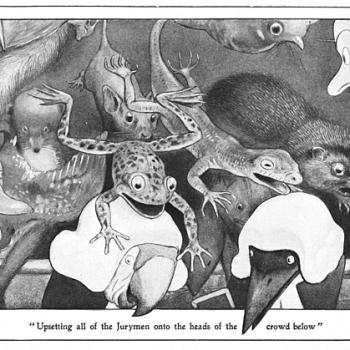I was renting a car last week and participated in a conversation at the rental counter with the branch manager and another customer. The manager was from a Middle Eastern country, although he didn't specify which one. He said, as immigrant Americans often do, that Americans are the kindest, most generous people in the world. He told us that if we hadn't lived anywhere else, we might not realize that. But in his view, Americans really are different. If he had one beef with Americans, it was how hard we work. His son and daughter-in-law had settled in France precisely because of the prohibitive American work ethic.
Having lived and traveled extensively overseas, I have heard these sentiments expressed on many occasions over the years. But last week, I wondered for the first time if the fabled generosity and work ethic of Americans would survive in the decades ahead. The support infrastructure seems to be crumbling, in at least some key ways. Our sense of national character is in a state of disunity and confusion. Different groups of people are deeply dissatisfied with our national direction, and for different reasons. Our economy, long resilient, seems vulnerable as never before. The wider world is increasingly unstable; there is a real fear of war, the collapse of governments and currencies, and the disintegration of security alliances.
Almost as soon as I began this line of thought, however, I realized something important. It's something I don't think Americans have given much consideration to in the course of my lifetime—largely because we have lived in a "Pax Americana" in which our national power has seemed to be the bulwark against chaos, disorder, and threats in the world. The principle we have forgotten is that our personal character is what guarantees national character. It is not the other way around: we as individuals are not hard-working and generous because America is strong and prosperous. America is strong and prosperous because we, each individually, are hard-working and generous.
This is not a principle to be taken lightly. It is aligned with the principle of God's kingdom that good overcomes evil (Rom. 12:21). This is one of the hardest concepts for us to wrap our minds around; to the natural human mind, good doesn't always look like it has the defenses necessary to survive against evil. It seems too "nice" to stand up for itself under threat. Our reasoning suggests that positive qualities in a society are vulnerable and need the organized protection provided by our less attractive traits if they are to thrive.
But the truth is that the positive qualities themselves are our protection. That doesn't mean we can dispense with typical forms of organization like law, police, and the military. It does mean that how those organizations perform is a function of our character, rather than vice versa. Law and armed force cannot be more moral and dependable than the society that constitutes them. The character of the people comes first.
If politics and human criticism drive our perception of our character, we will seesaw endlessly between pride and self-doubt. Fortunately, there is a more enduring standard. Micah 6:8 is hard to improve on: "And what does the LORD require of you? To act justly and to love mercy and to walk humbly with your God" (all citations NIV). James 1:27 tells us the following:
"Religion that God our Father accepts as pure and faultless is this: to look after orphans and widows in their distress and to keep oneself from being polluted by the world." And Jesus could not have been plainer in Matthew 22:37-40:
"Love the Lord your God with all your heart and with all your soul and with all your mind." This is the first and greatest commandment. And the second is like it: "Love your neighbor as yourself." All the Law and the Prophets hang on these two commandments.
Along with this changeless standard, there is a better method of assessment than human critique. Our consciences stand or fall before God, not the praise or criticism of men. Man looks at the outward appearance, but the Lord looks at the heart (1 Sam. 16:7). His approval of our generosity and work ethic gives us no pride or concern for our position; it gives us peace.
There is tremendous variety in how this plays out for millions of individuals—America is living proof of that. The days ahead promise some level of difficulty and turmoil, but we need not face them with discouragement about our liberties or the positive opportunities of other nations and peoples. If we would have America be great, we cannot do better than to let God guide each one of us in being good.
3/21/2011 4:00:00 AM





